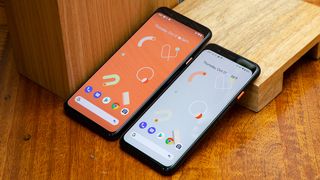Android 11 Developer Preview 2 promises improvements for foldable phones
Along with 5G app compatibility and more

Google launched its first Developer Preview of Android 11 much earlier than anticipated, and the tech giant has now followed it up with a second developer-focused (DP2) release of its mobile OS, building on some of the initial improvements and adding a few extra.
You can download the new version from the Android Developer blog, but as was the case with the first release, it’s still only compatible with Google Pixel handsets (excluding the first generation) and you’ll need to flash your device in order to install it, unless you have the previous version which will get updated over-the-air.
Because of this rather involved setup process, and its niche prerequisites, it’s clear that the update is still intended purely for developers, but we can still learn plenty about what Google aims to introduce when Android 11 does hit the mainstream.
New features
One of the main new additions found in DP2 is support for apps to communicate with the hinge sensors in foldable phones, allowing them to detect the angle that the phone is folded at and behave accordingly.
While there are multiple ways in which this information could manifest within app changes, perhaps the most pertinent one would be the ability for the app in question to change its view and input method when it detects the screen to be folded, dividing its display and keyboard between the two halves, for instance.
Apps will also be able to set a preferred screen refresh rate, so for the increasing amount of phones that feature variable rates (the Google Pixel 4 being among them), the handset will be able to adjust automatically when open.
- Android 11 will tell you if you're not doing wireless charging properly
- Android 11 could let you double-tap the back of your Pixel to launch apps
- Android 11 preview shows the Google Pixel 5 might have premium charging feature
Some improvements to additions from the first Developer Preview have landed too, with 5G detection getting more granular so that apps can more accurately tell when a user is on a high-speed network and adapt its experience accordingly.
Get daily insight, inspiration and deals in your inbox
Get the hottest deals available in your inbox plus news, reviews, opinion, analysis and more from the TechRadar team.
Apps will also be able to access more details when it comes to call screening functionality, so they can now report more specifically on the reason for a call being rejected, enable users to mark them as spam from within the app, and access the user’s contacts for cross-referencing.
Android 11’s public release is still slated for Q3 of 2020 and there’s no guarantee that any of the features from this early in the testing stage will make it, but for the major updates at least, we’re very likely to see them in the final build given the history of Android updates.

